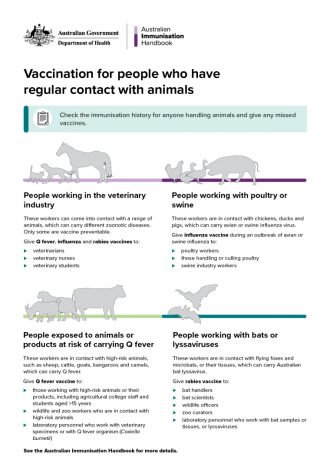Infographic. Vaccination for people who have regular contact with animals

Description:
Recommendations for vaccination for people who have regular contact with animals
Check the immunisation history for anyone handling animals and give any missed vaccines.
- People working in the veterinary industry: These workers can come into contact with a range of animals, which can carry different zoonotic diseases. Only some are vaccine preventable. Give Q fever, influenza and rabies vaccines to veterinarians, veterinary nurses and veterinary students.
- People working with poultry or swine: these workers are in contact with chickens, ducks and pigs, which can carry avian or swine influenza virus. Give influenza vaccine during an outbreak of avian or swine influenza to poultry workers, those handling or culling poultry, and swine industry workers.
- People exposed to animals or products at risk of carrying Q fever: these workers are in contact with high-risk animals, such as sheep, cattle, goats, kangaroos and camels, which can carry Q fever. Give Q fever vaccine to those working with high-risk animals or their products (including agricultural college staff and students aged >15 years), wildlife and zoo workers who are in contact with high-risk animals, and laboratory personnel who work with veterinary specimens or with Q fever organism (Coxiella burnetii).
- People working with bats or lyssaviruses: these workers are in contact with flying foxes and microbats, or their tissues, which can carry Australian bat lyssavirus. Give rabies vaccine to bat handlers, bat scientists, wildlife officers, zoo curators, and laboratory personnel who work with bat samples or tissues, or lyssaviruses.
See the Australian Immunisation Handbook for more details.
Downloads
These files may not be suitable for users of assistive technology.
Page history
Last updated
Last reviewed
Related chapters

